Atlantic Monthly Contributors's Blog, page 132
June 28, 2016
The Squirrel-Hunting Accident that Brought Down a Police Chief

The mayor of Portland, Oregon, announced the city’s police chief would retire after a two-month criminal investigation into allegations Chief Larry O’Dea mistakenly shot his close friend in the back while squirrel hunting.
Mayor Charlie Hales made the announcement Monday, and by late that night he’d already appointed a replacement police chief. Hales said he was reserving judgement in the investigation until it was completed, and was displeased that Chief Larry O’Dea had been the victim of a “trial by media.”
The shooting happened in April, while O’Dea was on vacation in eastern Oregon with his friends, hunting a type of ground squirrel colloquially called “sage rats.” During the rodent hunt, O’Dea’s .22-caliber rifle fired and shot his friend in the back. O’Dea and the other hunters took the man to a restaurant, where rescuers airlifted him to a hospital. When interviewed by investigating deputy Dave Ward, O’Dea made it seem the shooting was self-inflicted, and the man had accidentally shot himself in the back.
But after he spoke with the victim, Ward had a gnawing feeling O’Dea wasn’t telling the truth, as the Oregonian reported:
"The victim made it pretty clear he didn't shoot himself,'' Ward said. "The victim knew who shot him.''
That's when the Sheriff's Office called state police to step in, he said.
"As soon as we found out who was involved, and the victim's statement was different than the statements that had been made at the scene, I contacted Oregon State Police for help in investigating it,'' Ward said. "We are in no way willing to participate in, or have been involved in any type of cover-up.''
The deputy followed up, and after O’Dea admitted he’d “negligently discharged” his rifle, there was a scurry of news reports. The story gained enough notice that Hales put O’Dea on paid administrative leave in May. Then on Monday, Hales said the controversy had caused too much “turmoil and confusion,” and he named a new police chief, Mike Marshman.
Meanwhile, the investigation into the rodent-hunting mishap will continue. O’Dea’s lawyer told the Oregonian he was confident there would be no criminal charges.

Why the U.S. Senate Blocked Funding to Combat Zika
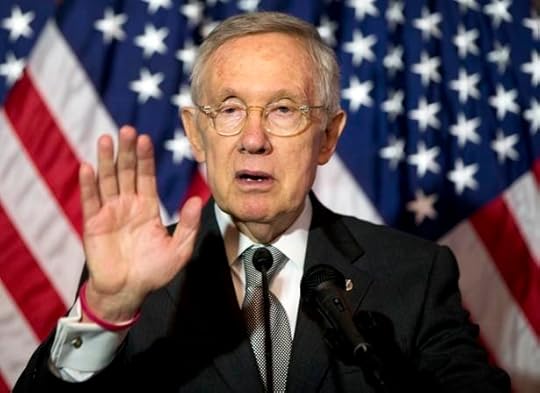
Updated June 28 at 1:58 p.m. Eastern
NEWS BRIEF Democrats in the U.S. Senate on Tuesday blocked funding efforts to battle the Zika virus, all but ensuring that Congress will miss its self-imposed July 4 deadline to approve emergency aid ahead of a summer season that may see the virus spread inside the United States.
The bill, which had already passed the House, failed to win the 60 votes it needed to break a filibuster as senators fell almost entirely along party lines in a 52 to 48 tally. Democrats opposed provisions restricting funding to Planned Parenthood and spending cuts that Republicans insisted on including to offset part of the $1.1 billion in money earmarked for Zika prevention and treatment. Republicans routinely try to bar money from Planned Parenthood because the nonprofit group is an abortion provider, but Democrats assailed the restrictions in the Zika bill because they argued that family-planning services were critical in preventing transmission of the virus. “We know Zika can be sexually transmitted,” Senator Charles Schumer of New York said in a floor speech. “We know that it poses the biggest danger to pregnant women and their unborn children, many of whom rely on health centers and Planned Parenthood as their primary health-care provider, but Republicans can’t miss a chance to whack Planned Parenthood, even if their services are exactly what can help prevent the spread of this debilitating virus.”
While the final bill does not mention Planned Parenthood specifically, it routes the money in a way that walls off the funds from family-planning clinics. An earlier version put the money into a different block grant that would have allowed Planned Parenthood to receive some of it. Some of the $1.1 billion is directed toward researching Zika and developing a vaccine, while other funds are earmarked for health services like treatment and prevention.
All but one Democrat, Senator Joe Donnelly of Indiana, voted no. Republican Senators James Lankford of Oklahoma and Mike Lee of Utah also opposed the measure, which appropriated money to veterans and military construction programs. Senate Majority Leader Mitch McConnell switched his vote to “no” at the end of debate so that he could bring the bill up for another vote. But that is not likely to occur before lawmakers leave on Friday for a long holiday weekend.
Congress’s inability to agree on Zika funding after months of increasingly urgent warnings from the Obama administration and the public-health community is its latest embarrassment, and the partisan recriminations were particularly bitter in the minutes after the vote. “So here we are!” the normally subdued McConnell exclaimed. “In an utterly absurd position of playing political games as this public-health crisis mounts all across this country.” The Republican leader pointed out that Democrats had supported the $1.1 billion funding level in the Senate’s initial legislation, but he made no reference to the more partisan provisions that were added when GOP negotiators in the House and Senate hashed out a final agreement. The Obama administration had requested nearly $2 billion in aid at the beginning of the year, but the White House had threatened a presidential veto of this bill because of the Planned Parenthood language and the offsetting program cuts.
The Democratic leader, Harry Reid, accused Republicans of trying to advance “fake funding” that would prevent women from accessing reproductive health care that could prevent transmission of the virus. “I don’t know what universe my friend is living in,” Reid said. “What does he think? That we’re all stupid? That the American people are dumb? Well, they’re not.”

The Trump Campaign Just Became Literature
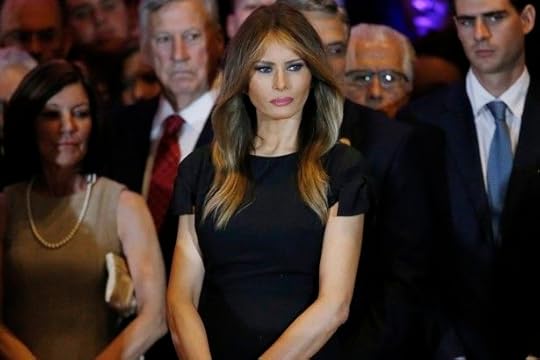
“Melania decided she would order the flowers herself.”
So begins the new short story from Chimamanda Ngozi Adichie, the first such work commissioned by, and for, The New York Times Book Review. The paper gave the acclaimed writer—author of Americanah and Half of a Yellow Sun, and the recipient of a MacArthur Genius grant—a broad assignment: Write anything about this election season you like.
Related Story
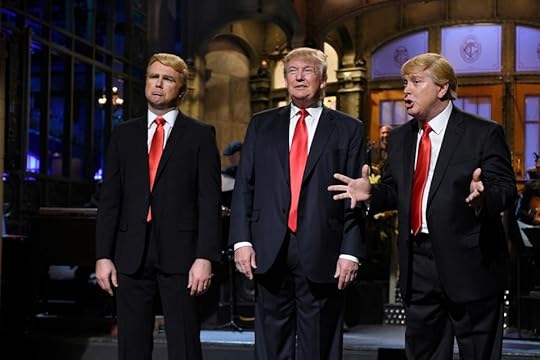
Where Saturday Night Live Failed This Season
Adichie chose Trump. Specifically, she chose the Trumps. And the result of that is “The Arrangements,” which, as its opening line suggests, trains its gaze on Melania, the woman most Americans know as silent and stoic and, perhaps most of all, a cipher. “The Arrangements” is, in the manner of Curtis Sittenfeld’s Eligible, a tribute to an earlier work of literature—in this case, Virginia Woolf’s Mrs. Dalloway, one of the still-soaring examples of literary modernism, and an early-20th-century novel that’s especially notable for being told from the perspective of a woman. In that sense, “Melania decided she would order the flowers herself” is at once a call-out to Dalloway’s opening line, an ironization of that line—ordering instead of buying—and a declaration of Adichie’s intent: It is Melania who will do the deciding. It is Melania who will do the thinking. It is Melania who will deal with the flowers.
This kind of overlap, the news colliding with the novel, is common in a culture awash with fan fiction; it is much less common, however, for the non-fictions in question to involve political candidates. Art and politics have tended instead to chafe, uncomfortably, against one another. The 2008 election’s most direct fusion of the two, Shepard Fairey’s HOPE poster, ended in a lawsuit. And for 2016, especially when it comes to the most common commingling of the political arts and the literal ones—satire—Trump in particular has been notoriously difficult to mock, largely because he so successfully mocks himself. There have been exceptions, certainly: Yuge!, from Garry Trudeau, is a collection of “Doonesbury” strips about Trump from the past 30 years—a celebration, Trudeau notes in his preface, of the businessman’s “big, honking hubris.” Trump and Me is Mark Singer’s memoir of the profile he wrote of the mogul for the New Yorker in the mid-’90s. A Child’s First Book of Trump, from the comedian Michael Ian Black and the illustrator Marc Rosenthal, explores, in high Seussian style, “the beasty ... called an American Trump.”
“The Arrangements” is a work of fiction inspired by a man who is, on various levels, himself a work of fiction.
But “The Arrangements” is, far from the other Trump takes, a distinctly literary interpretation of the mogul/reality star/candidate—a work of fiction inspired by a man who, on various levels, is himself a work of fiction. Where the story most notably distinguishes itself, however, is in its insistent elision of Trump’s perspective in favor of his wife’s. As in Dalloway, here, it’s the woman who is given a rich interior life; here, it’s the man who is opaque and objectified. Adichie blends blunt, harvested-from-media-profiles observations about Trump—“Donald disliked dissent”—with subtler, more intimate observations that come from Melania’s point of view:
The florists were indeed good, their peonies delicate as tissue, even if a little boring, and the interior decorators Donald had brought in—all the top guys used them, he said—were good, too, even if all that gold yellowness bordered on staleness, and so she did not disagree because Donald disliked dissent, and he only wanted the best for them, and she had what she really needed, this luxurious peace. But today, she would order herself. It was her dinner party to celebrate her parents’ anniversary. Unusual orchids, maybe. Her mother loved uncommon things.
So while Donald is not the focus here … there, still, he is. He pervades. He will be heard, even when it comes to the flowers. The Dalloway overlap with the world, and the politics, of 2016 would be discordant were it not for one of Adichie’s core observations: “Trump” is both a person and a power structure. He is, like the patriarchal society Clarissa Dalloway inhabited and navigated and reluctantly acquiesced to, omnipresent. “The Arrangements,” stridently in the Dalloway vein, derives its insights and its ironies from the interplay between the constraint of class-controlled, gender-performative banalities (“Her Pilates instructor, Janelle, would arrive in half an hour”) and the warm breadth of common human experience (“Summer sunlight raised her spirits”). Woolf’s novel, Adichie noted, “both criticizes, and is also complicit in, a certain kind of conservative class-privileged England.” She added: “I like to think this story has the same general spirit.”
It does. And adding to that spirit is another kind of irony: the disconnect between Melania, the person—the former Melanija Knavs, the model from Slovenia, the mother of Baron, the designer of jewelry, the seller of the “Melania™ Caviar Complexe C6” Skin Care System—and Melania, the narrator. Does Melania speak English to herself? Does she use language in the same way that Virginia Woolf did, or indeed in the same way that a writer who splits her time between Nigeria and the United States does? Would she really conclude, upon reading media coverage of herself and her husband, that the images “shifted her balance, left her spirit vaguely disjointed”?
It doesn’t matter, and this is the point. If Trump is indeed a power structure, then part of his effect has been to destabilize the relationship between fact and fiction—to render the notion of “truth” as a collective aim and a communal good a little bit quaint. Adichie’s story is an homage to Dalloway, but its name whiffs of The Corrections, and her story also manages to channel the anxieties, human and otherwise, that crackle through Jonathan Franzen’s work. “The Arrangements” as a title may reference, instead of failing and rehabilitation, flowers and functions and funerals, but its concerns are similarly sweeping in scope: What happens when the woman who wants to become the first lady of the most powerful country in the world thinks to herself, “Whether it was true or not, this was a morsel to be saved, molded, used in the best way”?

The Athletes Saying No to the Olympics Over Zika

The world’s number-one ranked golfer, Jason Day, said Tuesday he will not participate in the Olympic games in Rio de Janeiro this summer because of “concerns about the possible transmission of the Zika virus.”
The Australian is the second golfer in the past week to announce he would abstain from the Olympics because of Zika. Last week, another of the sport’s most popular names, Irish golfer Rory McIlroy, also said he would not attend.
The Zika virus is most dangerous to pregnant women, but can be transmitted through sexual contact. In his statement, Day cited concern for his wife and family as the reason he decided against playing. This year’s games are the first time in a century that golf will be in the Olympics, and Day had pushed for its inclusion.
As the Associated Press reported, Day is just one of many golfers and athletes who will not participate because of Zika. Others include Fiji’s Vijay Singh, and:
… Charl Schwartzel, Branden Grace and Marc Leishman, whose wife’s immune system has not fully recovered after she nearly died last year of toxic shock syndrome.
American cyclist Tejay van Garderen is among a handful of athletes outside of golf who also cited Zika as the reason behind not going to Rio. Basketball star Stephen Curry didn’t specifically cite Zika but noted that “other factors” played a role in his decision to skip the games.
Golf has had the most players decline to attend the Olympics this year, but none of golf’s top-ranked female athletes have pulled out.
In other sports, some athletes have decided to attend but take extra precautions against Zika. South Korea’s team will wear “Zika-proof” uniforms, which feature blazers and pants pretreated with mosquito repellent. John Speraw, the U.S. men’s indoor volleyball coach, said he will freeze his sperm for future use in case he becomes infected.

June 27, 2016
The Senate Races to Battle Zika and Help Puerto Rico
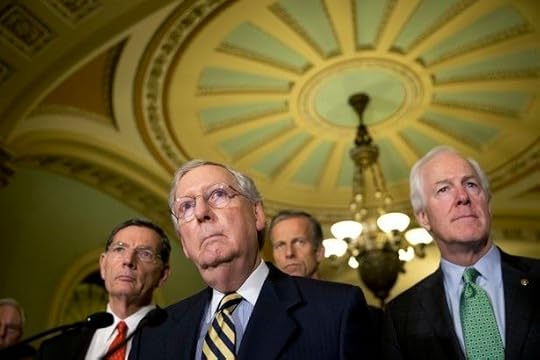
NEWS BRIEF The U.S. Senate is under time pressure to stave off a default by Puerto Rico and approve $1.1 billion to fight the Zika virus before lawmakers go off on a July 4 recess.
Republican leaders are trying to clear a pair of House-passed bills this week, but Democrats are demanding changes that could force the chamber to put off action on one or both. The more pressing issue—for the moment—is Puerto Rico, which must pay off $2 billion out of its $70 billion in debt by Friday, July 1 to avoid a default. In a letter released on Monday, Treasury Secretary Jack Lew implored Senate Majority Leader Mitch McConnell to send bipartisan legislation to the president, warning that without congressional action, the crisis in Puerto Rico would “ratchet up to an even higher level.” He wrote:
Puerto Rico has $2 billion in debt payments coming due that day, including payments on constitutionally prioritized debt on which Puerto Rico has not previously defaulted. In the event of default, and if creditor lawsuits are successful, a judge could immediately order Puerto Rico to pay creditors over essential services such as health, education, and public safety. This could force Puerto Rico to lay off police officers, shut down public transit, or close a hospital.
The House passed a compromise bill last month, but Democratic Senator Robert Menendez of New Jersey wants to amend it to make it easier for Puerto Rico to restructure its debt, among other changes, Politico reported. Any changes would require the House to act again on the measure, and since the House is on recess until July 5, that would mean Congress would miss the Friday deadline. The legislation could also faces defections from conservatives who consider it a bailout.
The partisan divide is even deeper over an appropriations bill for veterans and military-construction programs that includes $1.1 billion in Zika funding. Republican House and Senate negotiators struck a deal on the money last week, but as Nora Kelly reported, Democrats and the White House aren’t on board. They’re unhappy that $750 million of the funding is offset with spending cuts, and the $1.1 billion is less than the nearly $2 billion that the Obama administration asked for in the first place. They also oppose provisions aimed at restricting funding to Planned Parenthood.
McConnell noted on Monday that Senate Democrats had unanimously supported the $1.1 billion number when the Senate first cleared its version of legislation earlier this year. And he rejected claims that it limited access to women’s health programs. “Voting to block this bill now will delay Zika control funding well beyond the White House’s deadlines,” he said in a floor speech. “There’s no reason Democrats should reverse course now and block funding for Zika control in the midst of mosquito season. There’s no reason they should put partisan politics above the health of pregnant women and babies. And there’s no reason they should block support for our veterans either.”
The House passed the GOP compromise in the middle of the night last week as Democrats staged their sit-in to protect inaction on gun control. The Senate is expected to take an initial procedural vote on the plan Tuesday, but Democrats could block it from getting the necessary 60 votes to advance. If that happens, it raises the likelihood that lawmakers will head back to their districts, having missed yet another opportunity to respond to a virus that health experts believe will begin spreading in the U.S. later this summer.

California's Deadly Wildfires
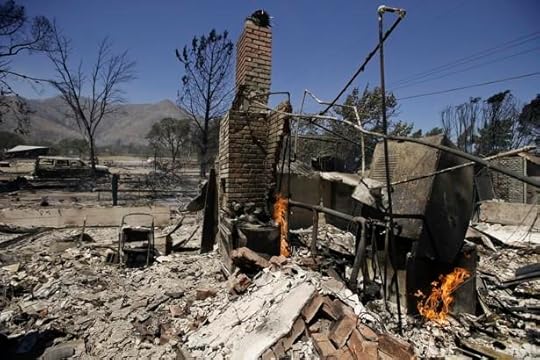
The fire that began last week in Kern County, California, has destroyed more than 150 homes, burned almost 50,000 acres, and killed two people.
About 2,00 firefighters are battling the blaze, known as the Erskine Fire, which was 40 percent contained by Monday. The fire is burning in the mountains around Lake Isabella, 150 miles north of Los Angeles. Hundreds of people in several communities have evacuated their homes. Many have had to stay in evacuation centers since shortly after the fire began on Thursday.
Weather has been a major factor in the fire’s explosive growth, and in the difficulty of containing it. As the Los Angeles Times reported, the coming week’s near 100-degree Fahrenheit temperatures pose a huge challenge:
“With those temperatures, there’s not a lot of humidity to work with,” said Carlos Molina, a National Weather Service meteorologist. “Conditions up there are dry right now. It’s favorable for the fire to continue growing at this rate.”
Molina said the conditions would likely persist throughout the week.
Further complicating matters, Molina said, if moisture from a monsoon currently in Arizona reaches to Kern County, it could cause thunderstorms and lightning that may spark additional fires.
Four consecutive years of drought have dried up much of California’s mountain ranges. A record 26 million trees have died in the Sierra Nevada mountains since October, partly due to lack of water, and partly due to a bark beetle infestation. The abundance of dead trees has given fires this year plenty of fuel, and already in 2016 about twice as many acres have burned compared to this time in 2015. Currently, seven fires are burning in the California.

Contraception in the Philippines
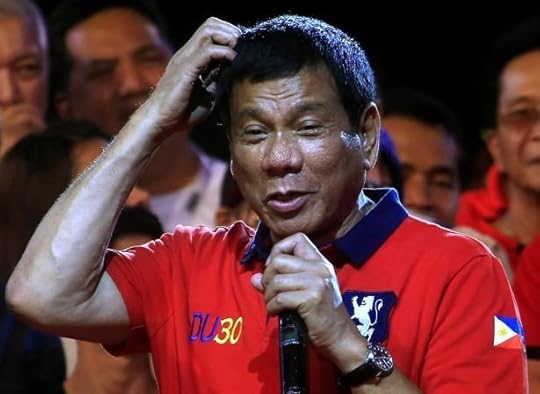
Filipino president-elect Rodrigo Duterte said Monday he would promote birth control in his country even though it goes against the teachings of the Catholic Church.
Duterte, who will be sworn into office Tuesday, said in his speech in Davao city that the country’s high birthrate was driving many families into poverty.
“I will reinstall the program of family planning. Three’s enough,” Duterte said. “I’ve also been colliding with the Church because it’s no longer realistic.”
And, he jokingly said, he would castrate those men who defy the rule. The long-time mayor of Davao has had a fraught relationship with the Catholic Church. He once cursed the pope because the pontiff’s visit had caused a major traffic jam in the predominantly Catholic country.
As The Philippine Star reported:
Duterte has called the Catholic Church “the most hypocritical institution” for its supposed failure to practice what it teaches. He claimed that bishops continue to teach morality but has failed to address clergy sexual abuses.
Last December, Duterte revealed that a Jesuit priest molested him when he was in high school but was too afraid to file a complaint.
As mayor of Davao, Duterte paid people who volunteered to undergo a free vasectomy. It wasn’t clear if he intended to replicate that policy nationally, but in his speech he did praise former-president Fidel Ramos, who promoted contraceptives when he held office beginning in 1992.

The Politicians Who Stayed Quiet on the Supreme Court's Corruption Ruling

The U.S. Supreme Court issued a pair of major decisions on Monday: one striking down a Texas law restricting access to abortion, and another vacating the conviction on federal corruption charges of the former governor of Virginia, Robert McDonnell.
Less than an hour after the justices announced their abortion ruling, reactions flooded in from political leaders of all stripes—President Obama, Hillary Clinton, governors, dozens of members of Congress in both parties, even local councilmen and women weighed in on what was considered the Court’s biggest decision on reproductive rights in a quarter century.
And after the McDonnell ruling? Crickets.
The decision to throw out the ex-Republican governor’s conviction was arguably no less significant: It will have ramifications for numerous other politicians who have been investigated, charged, or found guilty of public corruption. By narrowly interpreting what constitutes bribery by a public official, the ruling is also likely to change the way prosecutors try to police graft across the country. The justices issued their decision unanimously—a rarity in a major case by the sharply divided court.
Yet hours after the ruling came out, just about the only statements from politicians—the very people most directly affected by the decision—came from those who were already out of the game. Eric Cantor, a fellow Virginian and the former House majority leader, tweeted that he was “pleased that a unanimous Supreme Court finally delivered justice” to his friend. McDonnell expressed his “heartfelt gratitude” at the decision, although federal prosecutors could still decide to seek a new trial against him.
A jury in federal court convicted McDonnell and his wife of accepting gifts and loans valued at more than $175,000 as part of a corrupt scheme in which he promoted the interests of Jonnie Williams, who owned a dietary supplement business. In the majority opinion, Chief Justice John Roberts wrote that because McDonnell’s help to Williams—setting up meetings, making phone calls, and hosting an event—did not take the form of “official acts,” they did not necessarily constitute bribery.
Good-government groups were the most vocal after the ruling. Public Citizen attorney Scott Nelson said the decision “opens the way for corporate executives and wealthy individuals to undermine our democracy by buying influence at the state level.” Fred Wertheimer, the president of Democracy 21, said in a statement that the decision “belies reality.”
This decision is bound to further undermine the already low confidence of citizens in government and public officeholders.
There was a corrupt bargain at work here, and the Supreme Court has disarmed the ability of the American people to police similar corruption in the future.
The silence from politicians is telling, if understandable. Like McDonnell, many of those who have been accused of bribery or corruption attack overzealous prosecutors for “criminalizing” the normal give-and-take of politics. Yet to champion a decision that essentially validates that criticism could appear like a lawmaker is cheering a ruling that makes it easier for he or she to get away with the kind of behavior that voters repeatedly say they detest. As Roberts acknowledged in his opinion: “There is no doubt that this case is distasteful; it may be worse than that.”
The easy response from a politician would be to slam the decision as an affront to honest government. But a unanimous ruling from a court evenly divided between liberals and conservatives is harder to assail, and such a move could seem transparently opportunistic, or worse, hypocritical.
Aside from keeping the ex-governor out of jail for the time being, the most immediate impact of the McDonnell decision is likely to be on other lawmakers who are facing trial, or who were recently convicted, on similar charges. That includes Sheldon Silver and Dean Skelos of New York—two men who, until recently, were the most powerful members of the state legislature. Both Silver, a Democrat, and Skelos, a Republican, were sentenced to years in prison on federal corruption charges. Lawyers for Silver said the McDonnell decision would be “central” to his appeal on the grounds that the federal government had “gone too far in prosecuting state officials for conduct that is part of the everyday functioning of those in elected office,” The Wall Street Journal reported.
The decision could also be good news for Senator Robert Menendez of New Jersey, a Democrat and the former chairman of the Foreign Relations Committee who was indicted on charges that he used his office to benefit a campaign donor in exchange for more than $1 million in gifts and contributions. Menendez on Monday quickly released a statement praising the Supreme Court for its ruling on behalf of abortion providers in Texas. On the decision that could keep him out of jail, however, the senator said nothing.

Kanye West’s ‘Famous’ Indecency

On one of the great issues of the day, Kanye West has long made his position clear: Celebrity lives matter. He’s said that famous people are “treated like blacks were in the ’60s, having no rights.” He’s railed against how it “is OK to treat celebrities like zoo animals.” He’s vowed “to raise the respect level for celebrities so that my daughter can live a more normal life.”
The rapper says his new video, for “Famous,” is “a comment on fame.” It’s basically nine minutes of night-vision camera leering over sleeping naked bodies made to uncannily resemble—ready?— Taylor Swift, Bill Cosby, Caitlyn Jenner, Amber Rose, Ray J, Kim Kardashian, Chris Brown, Rihanna, Donald Trump, Anna Wintour, George W. Bush, and, yes, Kanye West. Watching it, you think of leaked sex tapes and the violation they represent. You think of how celebrities are the foremost victims and beneficiaries of voyeurism. You think of how famous people are, well, people. You think of tattoos and implants and hairpieces and snoring. You think, perhaps most of all, of West’s reputation as a jackass.
It’s up for debate whether the “Famous” video successfully critiques the exploitation of celebrities, but it’s not up for debate that the video partakes in that exploitation. As others have pointed out, West has created the ultimate piece of clickbait, inspiring the online content world to immediately churn out headlines about NSFW Taylor Swift and naked Donald Trump and Chris Brown sleeping next to the pop star he beat up. So West is profiting off his and his peers’ titillation appeal while also bolstering the industry built around that appeal. If this makes for a subversion, it’s one that has the obvious potential to backfire by inspiring more celebrity-impersonator nudity. The best-case scenario would be that viewers get so creeped out by the video that they reform their gawking habits—dubious, right?
Some of the featured celebrities surely are okay with the stunt: Kardashian attended the video premiere with her husband, Rihanna sings the hook on the song, and Chris Brown has responded to it with crying-in-laughter emojis. But it’s likely that some others portrayed in the video didn’t sign off on it—most notably, in the case of West’s most headline-grabbing inclusion, Taylor Swift. West’s camp and Swift’s camp had already been fighting in the press over the song’s lyrics, which mention her dismissively. He says she approved of those lyrics before they were released; she says she didn’t. “Taylor cannot understand why Kanye West, and now Kim Kardashian, will not just leave her alone,” her publicist told GQ for a story published just this month.
The video might critique exploitation, but it definitely partakes in it too.
After the video premiered, West tweeted then deleted, “Can someone sue me already #I’llwait.” It felt like confirmation that the video is in part a trolling attempt directed not only at the public but at the celebrities themselves. Online, you can find Photoshop jobs and fan art imagining each of these figures naked, but none of those creations have gotten the splash that West has now made. For someone like Swift, having a famous music video prominently feature mock-ups of her breasts represents, at the very least, a PR complication she did not ask for—and at the most, something much uglier. It’s hard to imagine how this jibes with West’s stated mission to advocate for respectful treatment of celebrities.
But it is easy to see how it jibes with West’s own obsessions. Toward the end of the song, after the camera has pulled wide and revealed a tableau resembling Vincent Desiderio’s painting “Sleep,” West suddenly looks up with a hint of a smile. He’s said he has an “addiction” to “the body,” and many of the filthy lyrics from his Life of Pablo album seem determined to demonstrate that even—or especially—in marriage, that addiction remains strong. One song, “Freestyle 4,” might have even been foreshadowing: He imagines himself at a Vogue party where everyone starts having sex with each other. Voyeurism might be one subject of this new clip, but it’s voyeurism that West himself seems to share in.
The credits sequence for the video thanks each of the depicted individuals “for being famous.” One implication is that celebrities don’t get a say in how they’re portrayed, fantasized about, used—their job is to be subjected to stuff like this. He’s probably right about that. But how can he complain about it now?

Black Flag’s Psychic Imprint
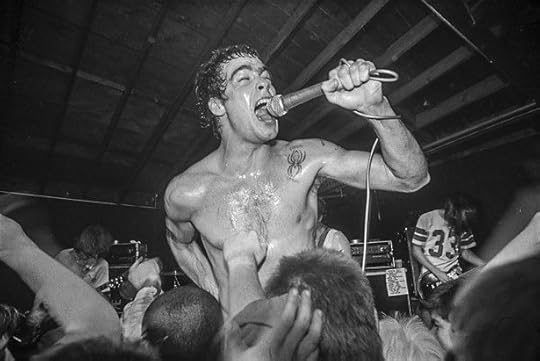
By the time it played its last show, 30 long-but-gone-just-like-that years ago in Detroit, Black Flag was a fairly complex cultural signal. The merciless vision of bandleader Greg Ginn had proved expensive in terms of personnel (Black Flag by the end was a band with more ex-members than members) and the abstracted furies of his guitar sound had shoved the music through mutation after mutation, from the riot-starting supra-Chuck Berry revvings of 1979’s “Nervous Breakdown,” through a mid-period intestinal art-crawl (“Scream,” “Nothing Left Inside”), to the punk-metal perversions that by 1986 comprised the bulk of the band’s live set.
Freaking out on his private frequency, Ginn was playing some of the wildest solos of his career, the hired-gun rhythm section of C’el Revuelta and Anthony Martinez plugging away gamely behind him. Meanwhile frontman Henry Rollins, having survived years of semi-ritualized beatings, burnings-with-lighters and stabbings-with-sharp-objects at the hands of his audience, was now a reconstituted Dionysus: bare chest, bare feet, rocking and lunging on splayed toes, with a predator’s tension or fixity in the upper body. And everyone had long hair. What exactly was this?
In the beginning, in the crucible of the Los Angeles punk scene at the turn of the ‘80s, there was no mistaking what Black Flag stood for: Opposition. To everything. I don't care what you have to say/ It makes no difference anyway, sang Groucho Marx in Horse Feathers, with jaunty nihilism. Whatever it is [BOMP!] I'm against it. Or to put it in Black Flag's terms: I wanna live/ I wish I was dead. The riffs were prophecies, the solos were freedom, the shows were bloody, and the lyrics were the wound of existence itself: Depression's got a hold on me/ Depression/ Gotta break free. Unbearable sensitivity was expressed with unanswerable power.
The songs broke their own toppling, tearing momentum with catastrophic time-slumps. Between songs, bassist-bodhisattva Chuck Dukowski would walk in tight, furious circles, silently shouting. The band didn't look like punk rockers; they looked like recently fired janitors. But L.A. is a horizontal city, and Black Flag's music blew holes in the ideological field, such that everything in a 30-mile radius that wasn't nailed down—every surfer/skateboarder, druggie, skinhead, indigent artist, curious soul, and every rejected emotion—came rushing into the breach. The LAPD took an oppressive interest, regularly —and violently—shutting down shows. (This fucking city/ Is run by pigs!) Black Flag worked very hard, penitentially hard, somehow combining vast amounts of not giving a fuck with a non-stop underdog campaign of snarling self-promotion.
Black Flag built almost single-handedly the touring circuit that would sustain American independent music for the next 20 years.
And behind or below it all was the riddling, inaccessible intelligence of the artist Raymond Pettibon, Ginn's younger brother. Pettibon had given the band its name, its logo—the infamous and ubiquitous bars, four black rectangles offset to represent the rippling of a (black) flag—and, via the flyers that he designed and that were then splattered all over L.A. to advertise upcoming shows, a graphic identity that amounted to a kind of poetic molestation. Weird sex jokes; hideous boisterous cheerleaders; Jesus figures; Manson figures; authority figures; a black man with a demonically erect penis hoisting a terrified little white cop over his head: In Pettibon’s flyers a personal netherworld of imagery seemed to conjoin with the Californian id at its most chaotic level.
Doesn't it all sound like another world? It probably was. To foist your bohemia on an indifferent public, to harrow the complacent, to shake it up ... Joe Carducci, the outsider intellectual who helped run Black Flag's label SST, takes the long view: “Our closing frontier,” he writes in his 2008 memoir Enter Naomi, “was the sixties cultural revolution as it died out in the seventies and early eighties. In retrospect the Black Flag/SST story looks like a cultural analogue to the Manson-Weathermen-S.L.A.-Black Panther-Nixon White House-People’s Temple endgame—art just had more life in it than crime or politics or religion.”
As to the legacy: Black Flag, going from town to town in its smelly and tightly-packed van, built almost single-handedly the touring circuit that would sustain American independent music for the next 20 years. SST released albums by the Minutemen, Meat Puppets and Hüsker Dü—some of the greatest rock music ever made. Henry Rollins—actor, spoken-word performer, talking head, global witness—has become a superb figure in American life. And a generation of music fans carries the psychic imprint of the Black Flag live experience.
“There was a part of just about every song,” devout roadie David “Davo” Claassen told me in 1997, “that would pull back and fucking strike out like a cobra, and you'd be slapped upside the head. It was a physical reality that you had to get to grips with. That was their musical gift to the world. The fact that it got sensationalized along the way because of the punk phenomenon, and that it now has marketability or whatever—it all strays from the fact that it had an intangible substance that everybody fucking strives for in their art. And it dished it out in big old fucking shovelfuls.”

Atlantic Monthly Contributors's Blog
- Atlantic Monthly Contributors's profile
- 1 follower



